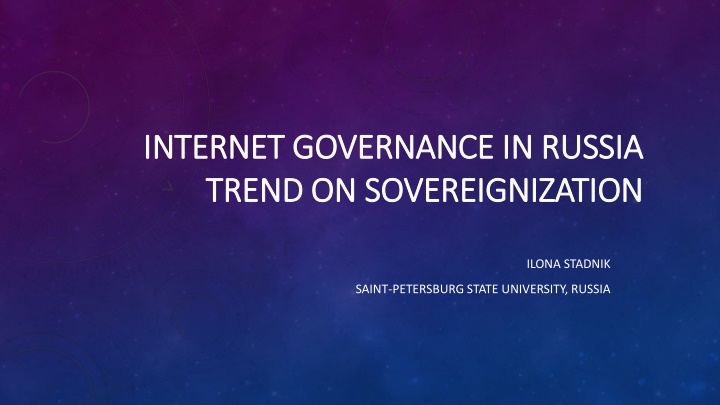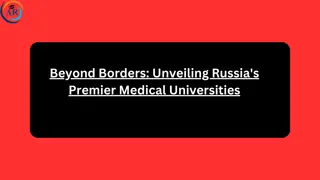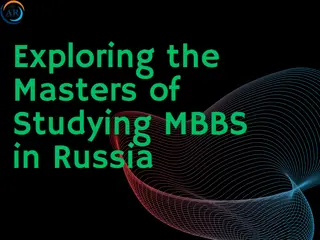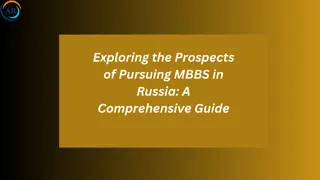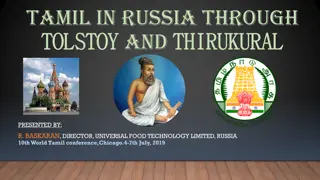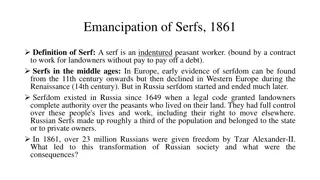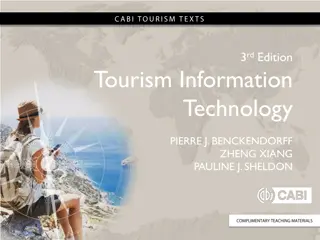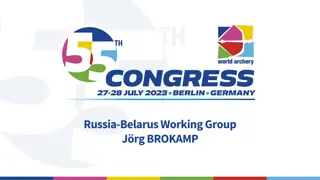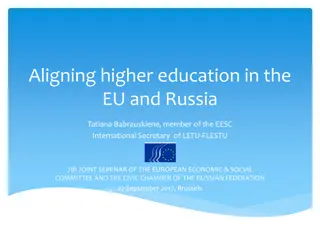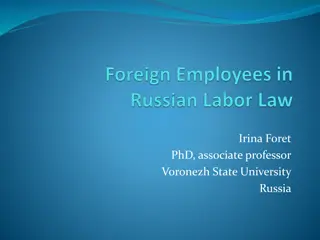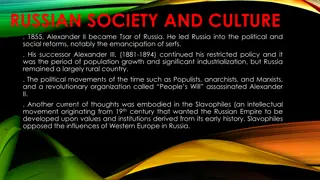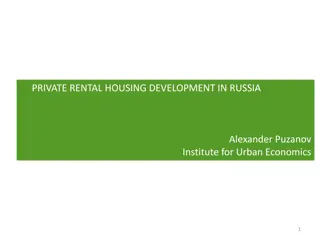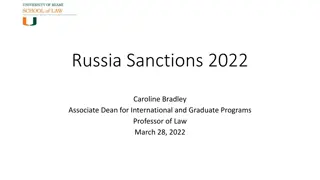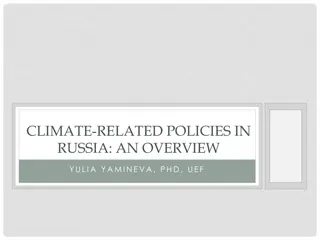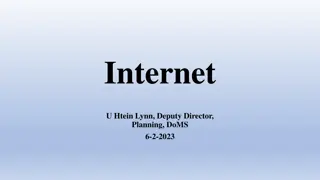Trends in Internet Governance and National Sovereignization in Russia
The discussion revolves around the trend of aligning cyberspace with national borders, emphasizing national security concerns in the context of internet governance in Russia. It covers topics such as reframing cybersecurity as a national security issue, militarization of cyberspace, territorialization of information flows, and efforts to control critical internet resources along national lines. The focus is on the reassertion of legal authority, content filtering, data localization, and reliance on national standards and technologies in the evolving landscape of internet governance in Russia.
Download Presentation

Please find below an Image/Link to download the presentation.
The content on the website is provided AS IS for your information and personal use only. It may not be sold, licensed, or shared on other websites without obtaining consent from the author.If you encounter any issues during the download, it is possible that the publisher has removed the file from their server.
You are allowed to download the files provided on this website for personal or commercial use, subject to the condition that they are used lawfully. All files are the property of their respective owners.
The content on the website is provided AS IS for your information and personal use only. It may not be sold, licensed, or shared on other websites without obtaining consent from the author.
E N D
Presentation Transcript
INTERNET GOVERNANCE IN RUSSIA INTERNET GOVERNANCE IN RUSSIA TREND ON TREND ON SOVEREIGNIZATION SOVEREIGNIZATION ILONA STADNIK SAINT-PETERSBURG STATE UNIVERSITY, RUSSIA
Cyberspace alignment to national borders instead of Internet fragmentation (Mueller 2017) Cyberspace alignment to national borders instead of Internet fragmentation (Mueller 2017) 1. National securitization Reframing Cybersecurity as a national security issue Militarization of cyberspace Nationalization of threat intelligence Reliance on national standards and technologies THEORETICAL FRAMEWORK THEORETICAL FRAMEWORK Reassertion of legal authority for network kill switches Methods to implement alignment 2. Territorialization of information flows Content filtering Data localization 3. Efforts to structure control of critical Internet resources along national lines
National Securitization National Securitization 2000, 2016 Doctrine on information security Reframing cybersecurity as a national security issue information operations troops since 2013 Militarization of cyberspace GOSSOPKA, NCCCI, and public/private CERTs Nationalization of threat intelligence Import substitution program for software 2015 Reliance on national standards and technologies Discourse of external kill switch Reassertion of legal authority for network kill switches local shutdowns of mobile Internet in Ingushetia Republic and Moscow
Territorialization Territorialization of information flows of information flows filtering practices since 2012 through adoption of specific laws. child pornography, information promoting drugs and suicide, calls for mass riots, extremist activities, participation in mass public events that violate the established procedure, unlicensed content buy a court decision or by request of federal executive agency Content filtering Blacklist is maintained by Roskomnadzor system Revizor checks the operator s compliance to block the banned Internet resources search engines must connect to the federal blacklist to automatically filter search results Google fined for incompliance in December 2018 Localization of personal data storage and processing (FZ-242) in 2016 LinkedIn is the first victim Civil proceedings against Facebook and Twitter in 2019, fines + new draft law on higher fines Data localization
Control over critical Internet resources along national lines (1) Control over critical Internet resources along national lines (1) General distrust in ICANN s work among the Russian leadership Cyber drills tested the external shutdown in 2014 Draft law (2016-2017) on the basic elements of the critical infrastructure of the Internet in Russia and its regulation introduced by the Ministry of Communication State Information System aimed to ensure the integrity, stability and security of the Russian national segment of the Internet, called GIS Svyaz : Traffic exchange points, including telecom operators and organizers of information distribution Network addresses and information on individuals who own these network addresses Numbers of autonomous systems of the Internet, and also data on persons/entities to whom such identifiers are provided, and date of their providing Routing policies for Internet packets
Control over critical Internet resources along national lines (2) Control over critical Internet resources along national lines (2) Second draft law (December 2018) on sovereign Runet to protect RUnet from external shutdown by hostile actors 6 (!!!) months later it was signed as a Law FZ-90, will come into force on 1 Nov 2019 - The law gives unprecedented powers to Roskomnadzor, initially a supervising agency - Failure to make Telegram messenger to comply with the anti-terrorist law and inability to block it for the Russian users - one of the main reasons for Roskomnadzor to take a big stake in the law enforcement
Control over critical Internet resources along national lines (2) Control over critical Internet resources along national lines (2) It is a set of amendments to two existing laws "on Communications" and "on Information": The main subjects responsible for stable operation of the Internet in Russia are telecom operators and owners and/or proprietors of: (1) technical communication networks (used for operations of transport/energy and other infrastructures, not connected to the public communication network), (2) traffic exchange points, (3) communication lines crossing the state border and (4) autonomous system numbers (ASN). Roskomnadzor will keep registries for the last three categories. All subjects must participate in the regular exercises for testing the stability of Runet. Roskomnadzor will execute the centralized management of communication networks in the event of threats to the stability and security of the Runet, by defining routing policies for telecom operators and other subjects and coordinating their connections. Telecom operators are required to ensure the installation in their networks of technical means for countering threats to the stability, security and integrity of Internet operation on the territory of Russia ("black boxes" with deep packet inspection functions). These technical means will also serve the purpose of traffic filtering and blocking access to prohibited Internet resources. The law creates a Center for monitoring and control of public communication networks under the Roskomnadzor supervision. The law creates a National Domain Name System
Control over critical Internet resources along national lines (2) Control over critical Internet resources along national lines (2) What is going on until November 1? ~ 40 regulatory acts to fill executive gaps: present a list of threats to the Runet present principles of centralized traffic management define technical parameters and rules for governing the "black boxes define how the registry of traffic exchange points will be formed define rules for providing information from operators and owners of ASN for maintaining various information systems, figure out how the national DNS will be formed and used by providers establish a Center for monitoring and control of the public communications network and define its powers
Control over critical Internet resources along national lines (2) Control over critical Internet resources along national lines (2) Up to date: only 5 regulatory acts passed approval Out of 28 prepared for consideration 17 violated the procedure of introducing new regulatory acts for public discussion, got a negative evaluation for its regulative power. Tests of filtering capacity of technical means for countering threats in the Ural region
The political intention to align Internet with the state borders of Russia is very strong. The most important technical part is still under consideration Unique discourse keep Internet accessible despite the external shutdown, but make it independent from the current Internet governance system created around ICANN and other related organizations CONCLUSIONS CONCLUSIONS Despite this, filtering of traffic is a priority In case of success, an example for other states with similar internet infrastructure composition?
QUESTIONS? QUESTIONS? Ilona.st94@gmail.com
